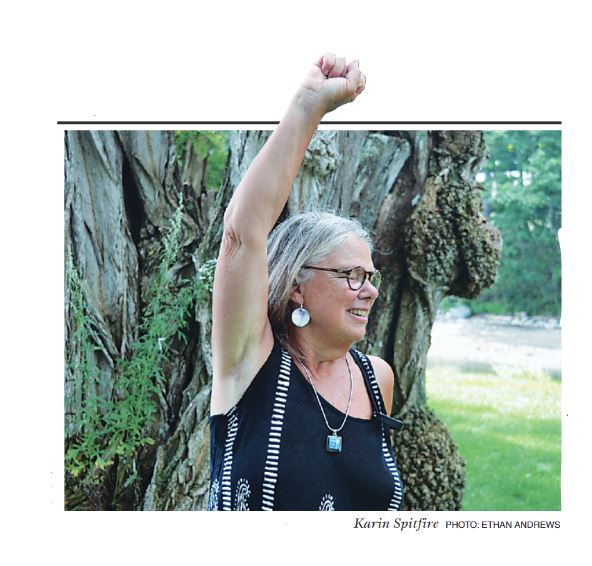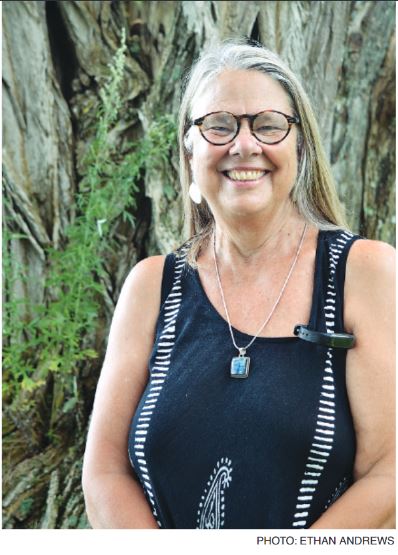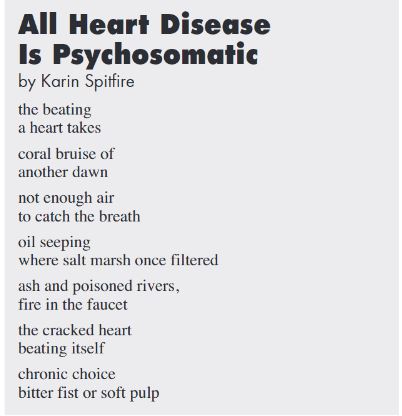by Becca Shaw Glaser August 24, 2021, The Free Press

“We’re currently in the fight for the planet and life itself on the planet, and everything’s connected to that. It’s a spiritual issue, it’s an emotional issue, it’s an intellectual issue, and the patriarchal paradigm is: control, have power, by the threat of death, and if you can’t control by the threat of death, kill. And it’s the exact opposite of what we want; we want to encourage life. Matriarchal cultures were about life-giving. It’s basic, it’s down to that kind of power struggle. It’s about power over, or the power of life.”
—Karin Spitfire, “Good Morning, Belfast!” March 2021
A woman made of ocean who wears the wardrobe of hospitals and tends to sick people, who lives in a home of burnt orange walls and living paintings, who performs her poems with a voice powerful, clear and shaky, plunges body into water of fish and seaweed who, year after year, grips signs calling for a more caring, equal world. When I asked Karin Spitfire what brought her to Belfast in 1987, it rolled right off her tongue: “I moved from Sedgwick to Belfast for the dance studio, the food co-op, the laundromat and the movie theater.” Since then, she’s been deeply involved in the Belfast community. One of the things she is most proud of is “For the Love of Herring: The Sardine Extravaganza,” a multi-faceted community/art/writing/activist/fishery workers event she organized, along with Gary Lawless, in 2010; both whimsical and serious, the Sardine Extravaganza led to improved sustainability regulations for herring in Maine. A poet, artist, feminist, activist and more, Karin spoke with me about her opposition to Nordic Aquafarms’ proposed land-based salmon “farm” in Belfast, her work as an occupational therapist in the modern health care system, being a lifelong feminist, and the struggle for legal recognition of Penobscot sovereignty.
Becca: You lived your first years in Connecticut. What originally brought you to Maine?
Karin Spitfire: When I was 16, I waitressed at The Fisherman’s Friend in Boothbay Harbor, and I said, “When I’m ready to settle down, I’m coming to Maine.” The reason I came here was because of the beauty; there’s enough nature here to temper my human insanity. So I came with my girlfriend in 1980. And we stayed.
Becca: You’re an outspoken critic of Janet Mills.
Karin: Lots of people are saying she did a great job during the pandemic. But I feel like any of the Democratic candidates that we had — and all of them were better than Janet Mills — would have done just as good a job, if not better. So that is not a reason to go, “Rah rah, Janet Mills.” She continues to be obstructive to every single aspect of the Penobscots’ gaining [legal] sovereignty. Two years ago there was a fabulous bill, LD2094, that addressed all the issues that have been brought up over the forty years since the Maine Indian Land Claims Act. Mills obstructed that bill. And she was in charge of the case against the Penobscots and the river as attorney general. She could have killed that suit any time. But she did not.
Becca: Tomorrow (August 1) you are going to a “Rally For The Penobscot River and Wabanaki Sovereignty.” What are some of the issues?
Karin: The state doesn’t recognize the Penobscots’ sovereignty. They don’t want the Penobscots to have control over the water in their river because their standards for ecological safety are higher than the state’s, and the state is dumping leachate into the river from Juniper Ridge. But the legislature can fix this.
Becca: In a “Good Morning, Belfast!” interview in March, you mentioned the importance of “not stealing Native American spirituality or practices.” How do you personally navigate this?
Karin: My position in relationship to working with any of the tribes is that when they call, I come; when they ask for something, I respond. And to try to be mindful and respectful of the fact that they have many, many things to do, and they have a limited amount of energy to educate and take care of White people. In terms of spirituality, all of the tribal nations have specific ceremonies, and that’s none of my business. I know that all of us have an ancient history, in our genetics of pre-patriarchy, and that all cultures worshipped in some manner with the drum and circles and singing and dancing. And that’s universal, but their way of doing it is not what I can do.
Becca: You currently work as an occupational therapist. What can you say about working at the hospital, or in general about what is happening in health care now?
Karin: Well, health care pretends it’s nonprofit, but that’s not true. All the services health care provides that take machines and drugs make money for the system. And the only thing that is not for profit is the labor. It’s corporate health care now. And they became corporate to deal with the insurance companies who control health care. One of the things that’s true now, that may not have been true before, is that doctors and occupational therapists, we have productivity that we have to meet. So you’re working with old sick people in a hospital, and you have to meet a productivity standard. Doctors are allowed 15 minutes by Medicare. Medicare For All would be a good thing, but Medicare needs to be revamped completely.

Becca: How has the pandemic affected your work?
Karin: Stress is off the charts. It’s like — we’re not in a triage situation in Maine, but we acted like we were in a triage situation. There’s a shortage of nurses and CNAs. The nurses fortunately have a union, so they can’t have a caseload of more than five patients. But the CNAs can have a caseload of 13 patients, and it’s impossible. Maine Health just raised their bottom-line pay to $17/hr. Northern Light has not done that, as far as I know. I don’t know how much the CNAs get paid, but they do not get paid a lot, and the CNAs have the hardest job. We know that the hospital got tons of money from the state, tons of money from the feds, but we did not get hazard pay. What they gave us was that if we got sick with COVID, they wouldn’t take our PTO. But now that’s done.
Becca: Why does Belfast, with its progressive reputation, have a City Council which seems to unrepentantly support Nordic Aquafarms’ plans?
Karin: Well, LePage, King, and I don’t know if it was Poliquin and Pingree, they came to town and brought it to the council first and the council supported it. [Belfast City Councilor] Mike Hurley said something about how it was going to take down our tax rate. Big, big number. And I asked, “When Front Street [Shipyard] came in, did it take down our tax number?” and I don’t think it did. [Becca researched. Front Street Shipyard opened in Belfast in 2011; since then, Belfast’s property tax rate has continued rising yearly, with only one small dip, in 2017.] And there’s not going to be a lot of jobs. So I don’t know why people are for it.
Becca: Why do you oppose it?
Karin: All you have to do is say “fish in a tank” to me, and I’m like, A) Salmon should be free, B) How many people do you know who’ve been able to keep fish in a tank alive?, C) When they paraded it out in town the first time, the first thing they paraded out was the problem of protein for the world as if their product was going to help protein for the world—but the people who are really in need of protein are not going to be able to afford their salmon. Their numbers are all really pretty, like the [amount] that’s going to go into the bay from their treatment was like 2% or something; they’ve probably changed that to 5%. But the actual numbers of what that is in terms of tonnage and water is enormous. Primarily, it’s an environmental issue of water, the taking of the water from the aquifer and the pollution of the bay. Water is life. And people really need to get that. Also, this is going to be in everybody’s backyard, with 24/7 generators, it’s gonna be next to the water — water carries sound; we’re gonna hear it.
Becca: Why do people support it?
Karin: [Nordic] came in with a pretty picture. And people bought the pretty picture, and anybody who says they have different facts than what Nordic has presented is called crazy and other names. It’s divided the town, because there’s a whole group of people who believe what a corporation is going to tell you. And we know that every corporation on the planet has in their budgets a line item to pay the fines for breaking environmental laws.
Becca: Would it be ethical for me to say, “I like eating salmon, but I don’t want this salmon infrastructure in my backyard”?
Karin: Farm-raised salmon is fatty and polluted. It’s one of the worst foods for you. Farm-raised salmon is full of toxins, and shit. They eat their own shit. Taste the difference between natural Alaskan salmon and farm-raised salmon, and you’ll know that farm-raised salmon is fatty and doesn’t have any flavor. So it’s not a good solution.
Becca: You’ve identified as a feminist since you were 16. How do you feel about feminism now?
Karin: It’s really complicated. Because capitalism co-opts everything. The way that it co-opted the non-radical, White feminist women’s movement was to have us go to work (and working-class Black women worked plenty before that). Feminism, as portrayed by capitalism, was for women to become like men; it was not portrayed as all of the good qualities that women have and all of the good work that women have done historically — women take care of the relations in their families, in their communities, the whole undercurrent of relational — that isn’t institutionalized — none of that has been brought up as “that’s what we want.” We want these things, we want this nurturing, we want the qualities that have been called maternal qualities, we want those things to be in our culture; those things have to be raised up equal to what men do, and what they shouldn’t be doing. That part of feminism has mostly been ignored.
My feminism was not about women being able to join the army and go to war. It’s anti-war, it’s anti-imperialism, it’s anti-racist. It’s Pro: pro-nature, pro-whatever you want to call life. I feel like my work now is in relationship to the environment and to racism. And that the feminist pedagogy I understand stands me well. One of the big failings of the feminist movement, I feel, has been the lack of continuity, the lack of being able to bring young people up into—the generation gaps.
Becca: Why do you think sexism is still so prevalent and patriarchy so strong despite generations of women (and others) working to transform it?
Karin: Because men benefit. And even if men don’t actually benefit —because it damages them too—they are not willing to give up the privilege that comes with it that many of them don’t even know they have. So the lesson for me in that has been, as a white person, to say, “OK, so everything I think that men should be doing in relationship to tackling their sexism and their privilege and being proactive for women’s issues is something I have to do as a White person in relationship to anti-racism.”

Becca: You’ve been mentioning capitalism. How do you define it?
Karin: I think we have to say corporate capitalism, because, you know, I believe in small businesses. The impulse to have a small business is a great thing, and provides lots of community things for local people, and usually it has to respond to the local community. But corporate capitalism does not. Their bottom line is money. And you know, Jeff Benzo? Bezos? Whatever the hell his name is, he thanked his workers [for giving him the money to blast into space]. And that’s what happens in capitalism. The labor produces the profit. Black people who were enslaved by White people made this country rich, created the money that this country is built on. That, and the labor of working class people, all the nurses, the teachers, the coal miners. And the other important thing about capitalism is that it is not a political system; it’s an economic system; democracy, socialism, social democracy, are political systems. We can have democracy and not have rampant corporate capitalism that is raping the earth.
Becca: Something I relate to with you is the constant internal struggle, knowing that we should be doing more to change all the injustices.
Karin: We’re not in a crisis; we’re in an emergency. If you’re in a fire zone, if you’re in 120 degree weather, if you’re in a hurricane, you respond because you’re in an emergency. But when all of that’s going on in the world globally, and I’m sitting on my deck here in the beauty of this perfect moment in July, how do I respond? I don’t have a good answer for that. And I’m really sorry I don’t, and that is the question that drives me crazy. Not only how do I respond, but what do I do differently? The personal solution of electric cars, solar panels, all those things are good. But they’re personal solutions. And they don’t move the whole big problem.
Becca: You wanted to talk about anger as love.
Karin: In this emergency state we’re in, rage is what’s appropriate. Rage keeps you from despair; it propels you to take action. That’s what the appropriate use of anger is, to help change something that is not right, and it sets boundaries. I feel like anger fuels my energy to make changes and to be active and to find creative solutions for things. I do that out of love; I don’t do that out of hate. I love myself, I love the planet, I love the beauty, I love the water. I love freedom; I love real freedom—which means that people get to express themselves from their inner self and culture, and I want everybody to have that, not just White men.
And the problem with that is you have to balance it with the life force and beauty. I make art, I make raspberry pie, I go strawberry pickin’ and I go swimming. And I sleep and eat good food and enjoy my friends and sing and dance when I can.
Becca: Yes, how to not let all the horrors bring you to constant despair.
Karin: I have to make sure I say yes to enough things! And to really know that we have life. Something that I learned from the Penobscots, from the Native American people that I’ve been privileged to listen to, is that the gift is life. The rest of it is the details. Life is the thing. We have it. So why are we making such a mess? Why does money mean more than the fact that you’re alive?
One of the things I loved about [self-described “chicana dyke-feminist, tejana patlache poet, writer, and cultural theorist”] Gloria Anzaldúa was that she said, “You have to have a wide mind” — you have to have a wide mind that can hold the contradictions of the fact that yes, I am upset and emotionally impacted in every way by these devastating things that are happening. And I have the gift of life, and I can be really grateful for this beautiful day, and these blue skies, and that I can sing, that I can sit next to you, that I can move. You have to do that. Because if we don’t appreciate the life force, then what are we doing it for?